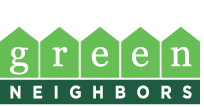Ready to learn more about recycling? Confused about what to put in your recycling bin and why? We have you covered!
Check out an upcoming free workshop to learn more about recycling and curbside composting.
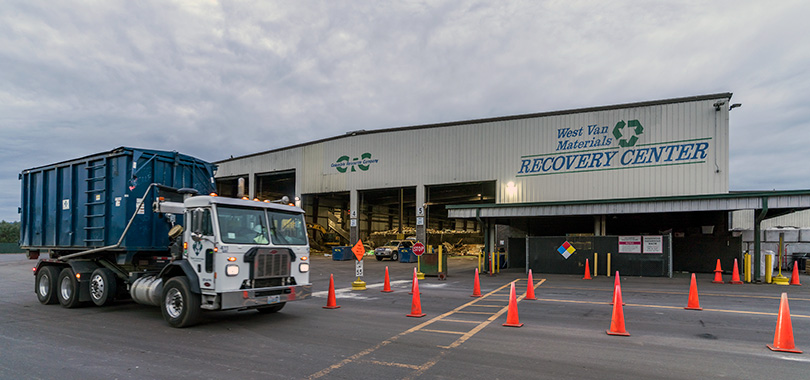
How does recycling work?
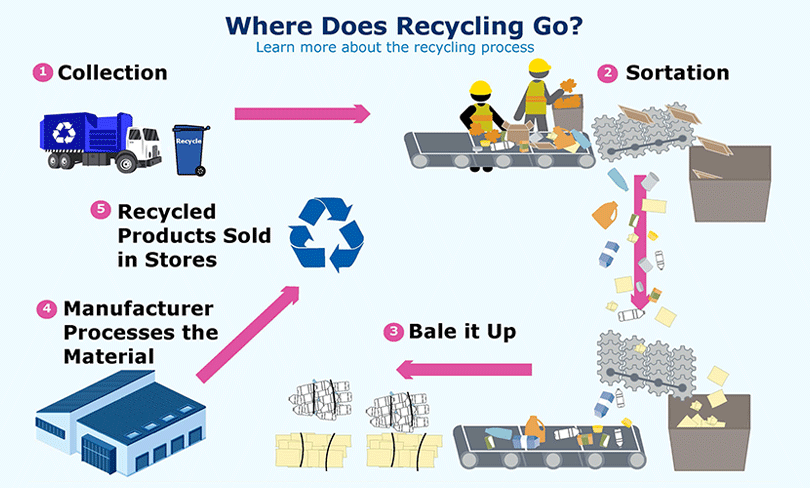
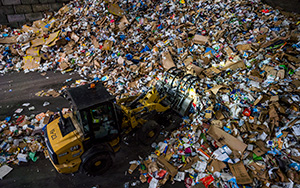 After you place materials in a recycle cart, either at a business or at home, recycle trucks come and pick up the materials. Mixed recycling is compressed in the truck. Glass, motor oil, antifreeze and batteries are special materials which are kept separate during transport.
After you place materials in a recycle cart, either at a business or at home, recycle trucks come and pick up the materials. Mixed recycling is compressed in the truck. Glass, motor oil, antifreeze and batteries are special materials which are kept separate during transport.
The recycling trucks dump material in specific areas at the Material Recovery Facility (MRF). The mixed recycling is piled onto conveyor belts to be sorted.
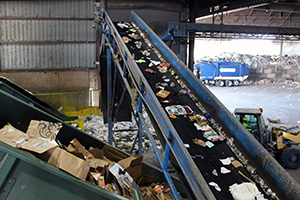 On the conveyor belt
On the conveyor belt
First is a belt of large spinning gears that sort out large pieces of cardboard while the rest of the material falls through to lines below based on the size of material. Workers pull out contaminants (things that cannot be recycled) and specific recyclables. A magnet pulls out small metals and a back eddy current sorts out the aluminum cans. Along the line, plastic bottles, plastic jugs, paper and cans are piled separately and compressed into bales. These bales are then shipped to local or international buyers who process the raw material into a substance that can be sold to manufacturers to make new products.
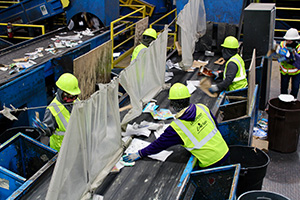 Recyclables are sorted by hand
Recyclables are sorted by hand
Our system relies on the sharp eyes and fast hands of our sorters, so it is important to keep them safe by only putting accepted materials into your recycling cart. If a material has a recycling symbol on it, it still may not be accepted in the curbside collection. Recyclables are sorted based on size and shape. Anything flat will be sorted into paper or cardboard so please keep out small scraps of plastic and metal, like lids and caps, unless they are securely fastened to the bottle. There may be other recycling options beyond the curb for certain materials, but these are separate from the curbside system.
You have an important role in keeping our recycled material high quality by recycling right and eliminating contaminants.
Problem materials (do not recycle)
-
1. Paper coffee cups
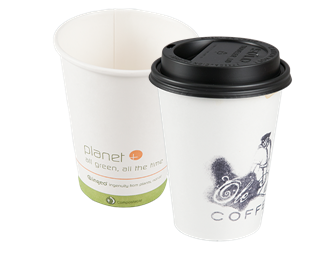
Soiled paper contaminated by food and liquids should be placed in the garbage. Additionally, paper coffee cups often have a plastic or wax lining making them non-recyclable and non-compostable. Reduce waste by using a reusable coffee cup!
-
2. Freezer boxes
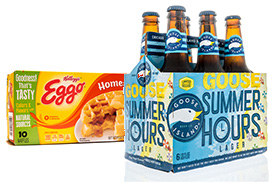
Any type of cardboard packaging that goes in the freezer or fridge has wet-strength packaging with a chemical composition to make it more durable and preserve food, but it is not recyclable. Most common are microwave/frozen dinner boxes, butter stick boxes, soda boxes, etc. Please place these boxes in the garbage to avoid contaminating paper recycling.
-
3. Plastic drink cups
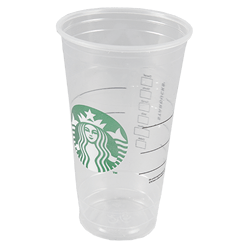
Plastic drink cups are weak and become smashed when collecting recyclables, making them difficult to separate from paper. Place these items in the garbage. You can reduce this waste by using reusable cups and straws!
-
4. Plastic lids
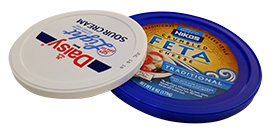
Whether plastic or metal, they may end up being sorted into paper bales because they are small and flat. Place metal lids in the can and crimp the lid so that it doesn’t fall out. Screw plastic bottle caps on securely. Discard snap on lids in the trash.
-
5. Plastic clamshell containers
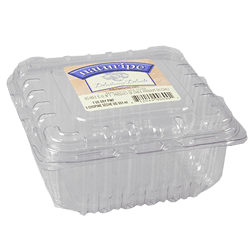
Plastic clamshells are very common in grocery stores and as take out containers. They often have a hinged lid and are composed of a brittle, clear plastic that shatters into pieces during the sorting process. This material is a challenge to recycle and should be placed in the garbage.
-
6. Plastic film/bag
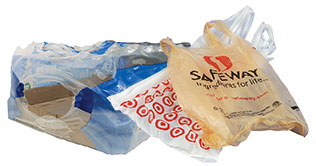
Plastic bags and other thin, stretchy plastic films and wraps get tangled in recycling equipment and cause the sort line to shut down while it is cut out by hand and thrown in the garbage.
Please dispose of plastic bags and film in the garbage. There are specialty recycling options for this material. Find locations to drop off plastic bags and stretchy film for recycling, search the Recycling A-Z Directory.
-
7. Block foam
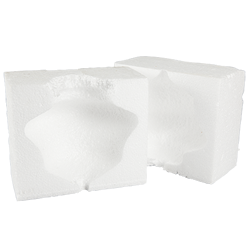
Block foam, also known as Styrofoam, is not recyclable curbside. This includes block foam cups, food trays and bulky packing material. Packing peanuts can be reused for packing and mailing and may be accepted by local post offices.
Please dispose of foam in the garbage or search for specialty recycling options using the Recycling A-Z directory.
-
8. Pizza boxes
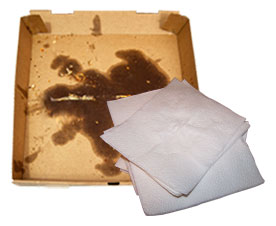
Any paper or cardboard that is soiled with food or grease is not recyclable. Greasy pizza boxes can be separated, the top half without grease can be recycled, the food soiled half should be thrown away as garbage.
-
9. Food
Keeping the mixed recycling dry and clean is important for the quality of the recycling. Ensure all items are clean and dry before placing them in the bin.
-
10. Textiles/clothing
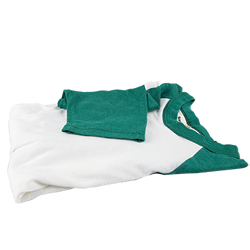
Clothes are a good resource that can be reused or repurposed. Donate these items to thrift stores if they are in good condition or get crafty and create something out of old fabric scraps. Textiles and clothing should never go in your recycling cart.
-
11. Tangly items
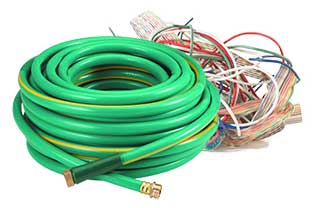
Items such as hoses, wire hangers, ribbons, and other long, stringy materials can get caught in the sorting equipment and cause the line to shut down while the waste materials are removed by hand. Please dispose of these items in the garbage.
-
12. Shredded paper
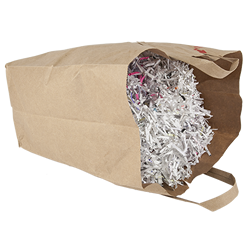
Shredded paper is too small and gets lost during the sorting process. Best practice is to drop shredded paper off directly at the transfer station or use a paper shredding company (companies may have fees).
-
13. Diapers
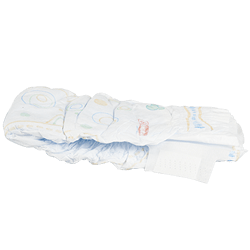
It may seem obvious that diapers, especially dirty diapers, should not go in the recycling bin, but we still see them coming down the sort line. Put diapers in the garbage. Please keep all human and pet wastes and non-recyclables out of the recycling cart. It is especially unsanitary for our workers who sort on the line by hand.

